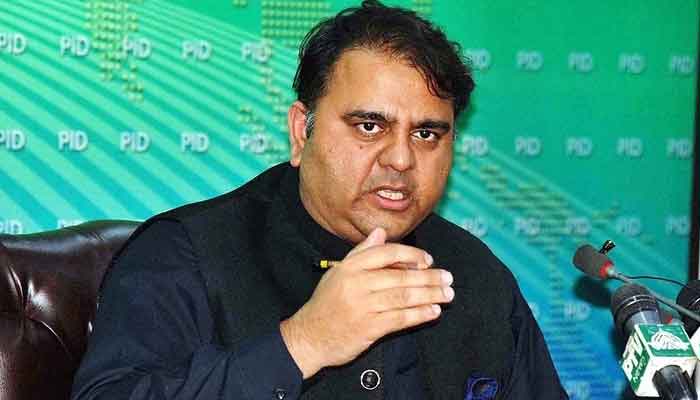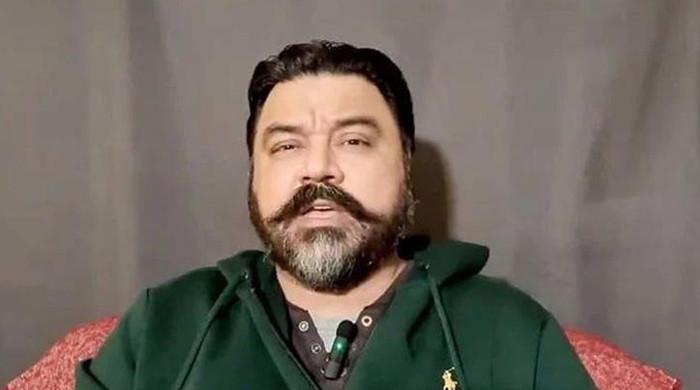Premature to comment on interim Afghan govt announced by Taliban: Fawad Chaudhry
Intelligence agencies will obviously create alternative framework of communication in absence of formal govt in Kabul: info minister
September 08, 2021

- It would be premature to respond to the announcement of a caretaker setup in Afghanistan, Information Minister Fawad Chaudhry says in interview with BBC World.
- Intelligence agencies formulate alternative frameworks in absence of formal governments, says information minister.
- Says kind of actions attributed to Pakistan in Afghanistan by Indian media are inspired from their film industry.
Federal Information Minister Fawad Chaudhry believes it is too soon to comment on the Taliban's announcement of an interim government in Afghanistan.
A day earlier, the Taliban announced the first members of a new "acting" government, three weeks after sweeping into full power with the takeover of Kabul, on August 15.
The new cabinet is made up of senior Taliban figures some of whom are notorious for attacks on US forces over the last two decades.
It will be led by Mullah Mohammad Hassan Akhund, one of the movement's founders, who is on a UN blacklist.
In a brief interview with BBC World shortly after the Taliban made its announcement, the information minister said he had learnt of the caretaker setup in Afghanistan on the programme's intro and so thought it would be too soon to make a comment on it. "I think it would be premature to comment at this time," he told the BBC anchor.
The BBC anchor then asked for a comment on the presence of ISI chief Lieutenant General Faiz Hameed, who has been in Kabul for the last couple of days. She said it is understood that the ISI chief is helping the Taliban shape the new government in Afghanistan.
Before this, the media reported that the CIA chief was in Kabul, then the the media reported that the Turkish and Qatari intelligence chiefs were also in Kabul, Chaudhry responded, adding that in the absence of any formal government in Kabul, obviously intelligence agencies will create an alternative framework.
He said Pakistan has "deep issues" with Afghanistan, giving the expansion of Daesh, migration and TTP as some of the examples.
For this reason, Chaudhry said, Pakistan has to have an informal line of communication. He said Afghanistan has no foreign minister and asked if Pakistan was to send its foreign minister, who would he meet?
He said this is the only framework to communicate.
"I will not say that we have no engagement with [the] Taliban. It was Pakistan's engagement with [the] Taliban that enabled US-Taliban negotiations. It was Pakistan's and Afghanistan's engagement that enabled and facilitated the evacuation of thousands of people stuck in Kabul," he said, adding that this engagement is now being appreciated by the world.
'Indian media crafting fairytales to show Pakistan helped attack on Panjshir'
"Frankly, its fairytales crafted by the Indian media and put all over social media where they use a video game to demonstrate that Pakistan is helping the attack on Panjshir," Chaudhry remarked when asked about the alleged involvement of Pakistan in the attacks on Panjshir.
"When I see this in Afghanistan and some of the Indian media, I feel that we are some supernatural power and we can do everything we want. Countries don't act like that," he said.
Chaudhry said that in Afghanistan, the kind of actions attributed to Pakistan by the Indian media are actually inspired from their film industry.
"They create stories. This is how marketing agencies work in India," he said.
US concerns on Taliban interim government
The Taliban drew from its inner high echelons to fill top posts in Afghanistan's new government on Tuesday, including an associate of the group's founder as premier and a wanted man on a U.S. terrorism list as interior minister.
World powers have told the Taliban the key to peace and development is an inclusive government that would back up its pledges of a more conciliatory approach, upholding human rights, after a previous 1996-2001 period in power marked by bloody vendettas and oppression of women.
Taliban supreme leader Haibatullah Akhundzada, in his first public statement since the Aug. 15 seizure of the capital Kabul by the insurgents, said the Taliban were committed to all international laws, treaties and commitments not in conflict with Islamic law.
The United States said it was concerned by the track records of some of the Cabinet members and noted that no women had been included. "The world is watching closely," a US State Department spokesperson said.
Afghans who enjoyed major progress in education and civil liberties over the 20 years of US-backed government remain fearful of Taliban intentions and daily protests have continued since the Taliban takeover, challenging the new rulers.
White House spokeswoman Jen Psaki told reporters on Air Force One, as President Joe Biden flew to New York, that there would be no recognition of the Taliban government soon.











